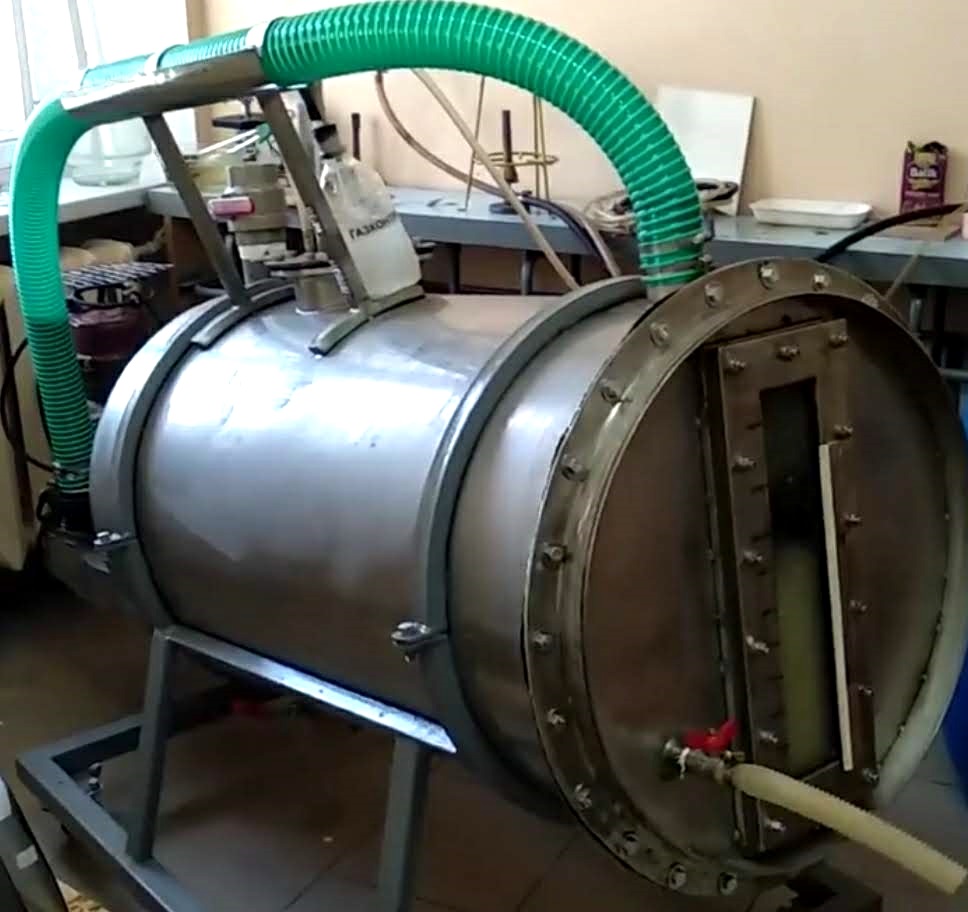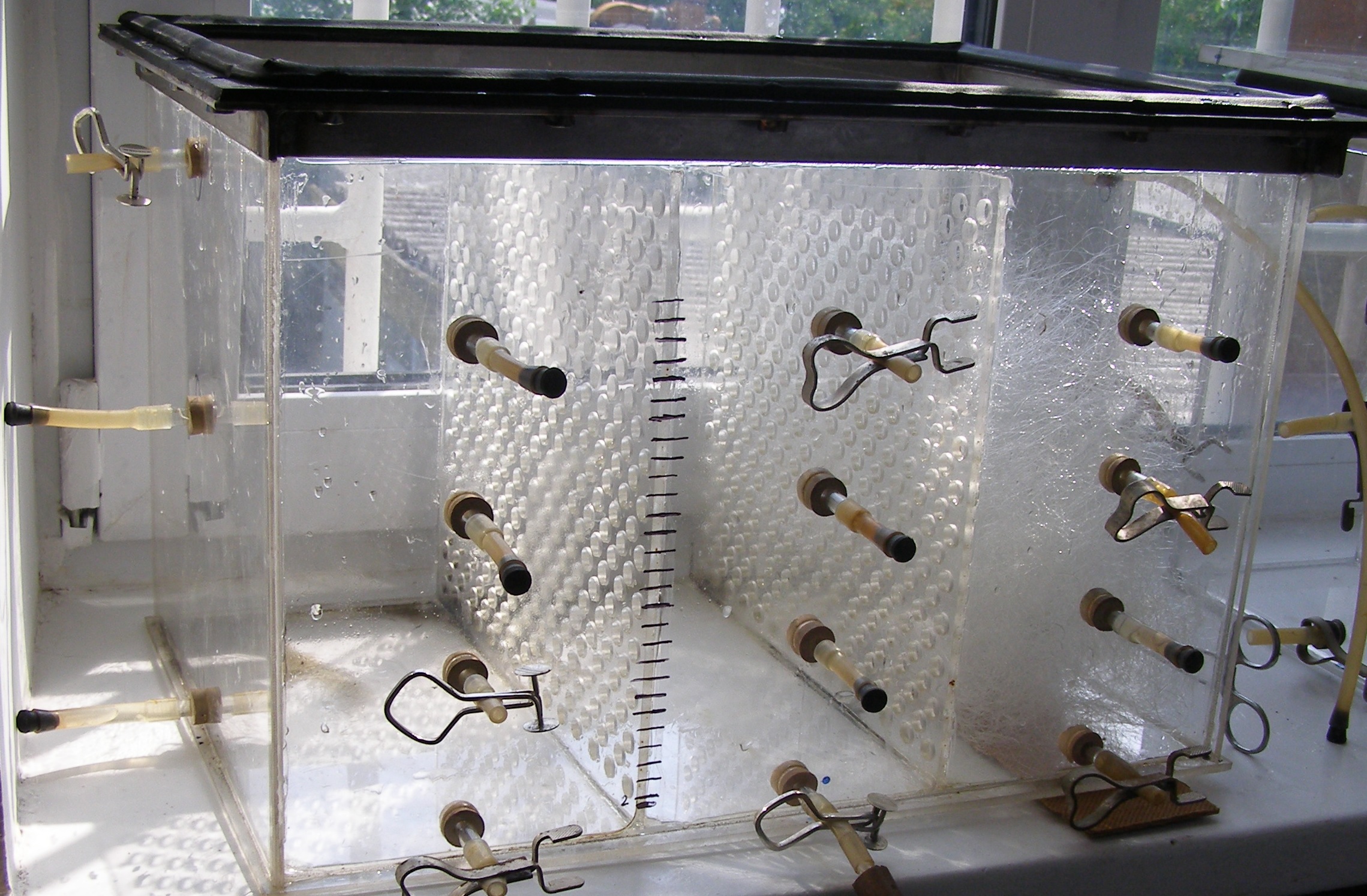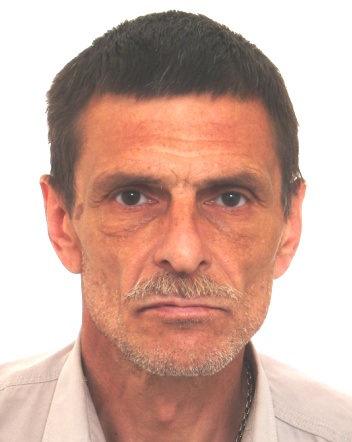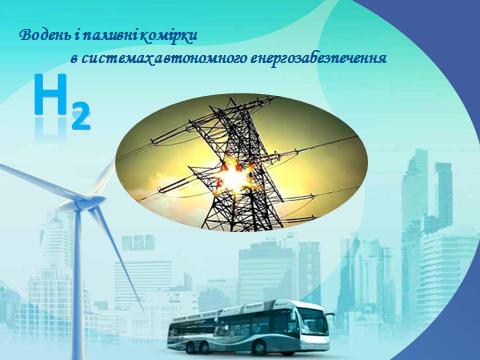|
|
|
Obtaining of fermentation parameters of experimental-industrial technology for synthesis of biohydrogen


General view of experimental-industrial reactor with the volume of 240 L for molecular
hydrogen obtaining via fermentation of ecologically hazardous multicomponent food waste as well as modular installation for purification of the filtrate
from dissolved organic compounds
|
Area of application
The developed biotechnology is promising for implementation both at large-scale food enterprises (factories for processing of vegetables and fruits etc.),
and for small enterprises (cooking waste of restaurants and hotels), as well as waste from farms. The developed biotechnology can be adapted and scaled
according to the needs of the enterprise. Industry for disposal of environmentally hazardous multicomponent food waste, companies getting clean energy
(H2) from environmentally
hazardous food waste are referred to strategically important areas of applications. The liquid phase purified from dissolved organic compounds can be
reused in the technological cycle increasing the profitability of the biotechnology.
Brief description
The thermodynamic calculations allowed to determine the optimal metabolic pathways of microbial synthesis of molecular hydrogen is the basis of the work.
The development of theoretical foundations of the process and their experimental confirmation was the result of the study of the process of H2
synthesis by microorganisms for more than 10 years. High efficiency of the process of molecular hydrogen synthesis via the fermentation of multicomponent
food waste was achieved. The high efficiency of the process is provided by developed granular microbial preparation containing highly active microorganisms
producing hydrogen, starting substrates and regulators of microbial metabolism. In addition, key fermentation parameters were identified, optimization of
which allowed to improve the synthesis of hydrogen. The technological efficiency and functioning of biotechnology is confirmed by its scaling for the
experimental reactor with the volume of 20 L, as well as the experimental-industrial reactor with the volume of 240 L.
The idea of the present research is to increase the efficiency of hydrogen synthesis via the fermentation of food waste in the experimental-industrial
reactor with a volume of 240 L, as well as the purification of the filtrate remaining after fermentation to obtain additional H2.
Previous studies have shown that the optimization of fermentation parameters in the experimental reactor with the volume of 20 L allowed 10-20 times
increasing the hydrogen yield with existing analogues. Therefore, industrial implementation requires to optimize the process scaling it at the
experimental-industrial reactor with the volume of 240 L. As a result of optimization, the high efficiency of molecular hydrogen production during the
fermentation of multicomponent solid food waste was confirmed. Thus, the yield of hydrogen VH2 was 50 L/kg of waste, the efficiency of waste destruction Kd
reached 85, the fermentation time was 2.5 days. In addition, the possibility of purification of the filtrate obtained after fermentation via aerobic and
anaerobic methods was shown. The first method was the oxidation of organic compounds to CO2 and H2O by aerobic microorganisms. The second
purification pathway was anaerobic methane fermentation of organic compounds.
Both methods are environmentally safe and promising for the application in integrated energy (hydrogen production) and environmental
(solid waste and soluble organic compounds decomposition) biotechnology. Their optimization and combination of destruction of solid organic waste with
hydrogen production, as well as purification of the filtrate from soluble organic compounds will develop an effective integrated biotechnology.
Expected results
High fermentation parameters of the efficiency of hydrogen synthesis, biosurfactants (fatty acids), degradation of solid food waste and purification
of toxic filtrate from dissolved organic compounds are planned to be achieved. The obtained parameters will serve as the basis for the development of
industrial biotechnology for the synthesis of hydrogen, the disposal of multicomponent food waste and purification of the filtrate.
Advantages
Environmentally friendly granulated preparation containing combination of microorganisms and complex of compounds that cause their effective
functioning provide efficient process of molecular hydrogen obtaining with maximal destruction of food waste. Optimization of cultivation regime during
application of preparation scaling the process provides cost-effective utilization of complex organic waste. Speed of waste destruction is 10-20 times
higher compared to other methods, decrease of waste volume and weight reaches 70-98%. Also valuable products can be obtained: methane
(30-40 L from 1 kg of absolutely dry weight of waste) or molecular hydrogen (24-190 L/ kg), technically clean water (residual concentration of organic
compounds doesn’t exceed 50 mg/L calculating to total Carbon), additional liquid and solid biofuels. Purification of the associated filtrate will create a
basis for the widespread application of efficient and environmentally friendly biotechnology.
Competitor
The USA, Netherlands and Asian countries (Japan, South Korea and China) are the world leaders in development of biotechnological processes based on
hydrogen fermentation use. Also these countries are the leaders in quantity of acting patents concerning developments of hydrogen obtaining from organic
compounds
State of development
During last 20 years biohydrogen production from organic waste is considered as a promising area of alternative energy.
The main method of biohydrogen obtaining from food waste is dark fermentation - destruction of nutrients of food waste by hydrogen-synthesizing heterotrophic
microorganisms. The interest in such way is driven by availability, widespread and low-cost of food waste as raw material to produce hydrogen in industrial
scale. The efficiency of hydrogen obtaining is provided by a number of distinctive features to improve the efficiency of hydrogen production and maintaining
constant optimal conditions for fermentation. In particular, there are specific cultivation conditions (patent US 8003344 B2 Microbial hydrogen-producing
process and system thereof NATIONAL CHUNG HSING UNIVERSITY, TAIWAN), maintaining of optimum pH (patent US 20070161104 A1 Waste management facilities for the
production of hydrogen gas and reduction of greenhouse gases), use of methods of waste pre-treatment and extra energy sources (patent CN 102363794 A Method
for producing hydrogen through kitchen waste enzymolysis and reinforced dark fermentation), maintaining of optimum concentration of nitrogen sources
(patent CN 102367455 B Method for producing hydrogen by improving anaerobic digestion of kitchen waste through controlling ammonia nitrogen concentration) etc.
Hydrogen fermentation is used as a separate process for molecular hydrogen obtaining as energy carrier, as well as the first stage of two-stage process of
hydrogen / methane fermentation for obtaining of gaseous energy carriers from organic waste (patent WO 2007075762 A2 Anaerobic phased solids digester for
biogas production from organic solid wastes). However, two major conditions prevent implementation of these processes in industry. First is the assessment of
technologies as insufficiently profitable. Another aspect is the low adaptability of the process - the complexity of its scaling.
Intellectual property
Contact information
Institute- Executor:Zabolotny Institute of Microbiology and Virology of National Academy of Sciences of Ukraine.
Ukraine, 03143, Kyiv, 154 Zabolotny str..
Tel.: 044-526-11-79,
e-mail: podgorsky@serv.imv.kiev.ua
Project 1 «Obtaining of fermentation parameters of experimental-industrial technology for synthesis of biohydrogen»
Project leader:
 Tashyrev Oleksandr B.
Tashyrev Oleksandr B.
project leader
doctor of Engineering
senior Research Fellow
Tel. +38 044 294-69-66
Е-mail: tach2007@ukr.net
 Hovorukha Vira M.
Hovorukha Vira M.
responsible executive
researcher
Tel. +38 095 906 72 84
Е-mail: vira-govorukha@ukr.net
|
|

 Tashyrev Oleksandr B.
Tashyrev Oleksandr B.
 Hovorukha Vira M.
Hovorukha Vira M.